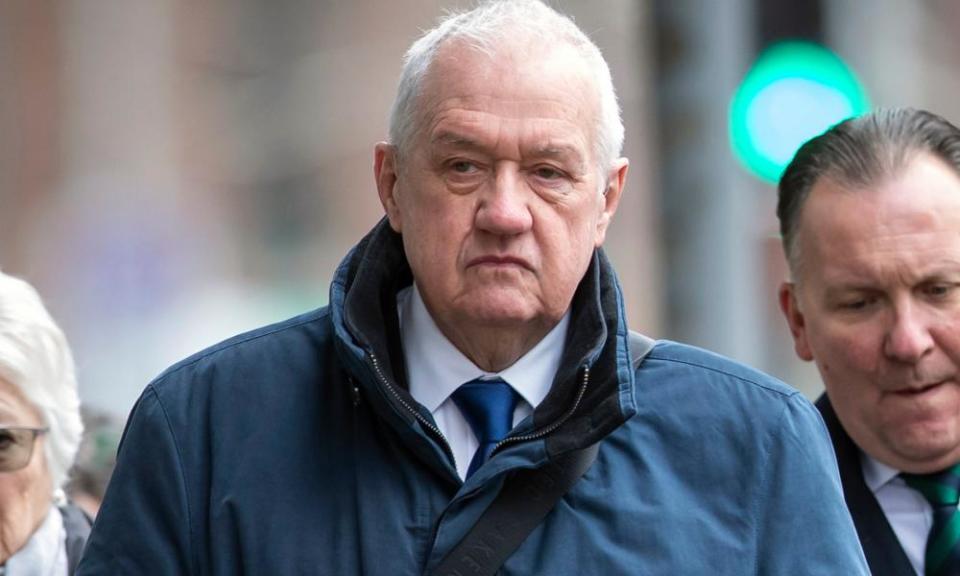Hillsborough police chief was personally responsible, court told

The South Yorkshire police officer who commanded the 1989 FA Cup semi-final at Hillsborough had “personal responsibility” for safety and the “terrible mistakes” and failures that led to 96 people being killed in a crush, the jury at his manslaughter trial has been told.
David Duckenfield was a recently appointed chief superintendent, the senior officer in charge of safety at the match between Liverpool and Nottingham Forest at Sheffield Wednesday’s Hillsborough ground, and it was not “unfair” to single him out to be charged, said Richard Matthews QC, prosecuting.
Setting out the case against Duckenfield in his closing speech at Preston crown court, Matthews alleged the multiple breaches of his duty of care to spectators, as the police match commander, satisfied the legal definition of “gross” negligence explained to the jury by the judge, Sir Peter Openshaw.
“So truly and exceptionally bad, so blameworthy, so reprehensible, and so deserving of punishment, that it deserves to be marked by conviction of the serious crime of manslaughter,” he said.
Matthews referred the jury to evidence Duckenfield gave in 2015 at the new inquests into the 96 deaths, in response to questioning by Paul Greaney QC, who represented the Police Federation.
Duckenfield accepted that after he ordered an exit gate, C, to be opened, to alleviate crushing at the Leppings Lane turnstiles by allowing a large number of people quickly into that end of the football ground, he failed to recognise the need to direct people away from a tunnel leading to the crowded central “pens” of the terrace.
“That failure was the direct cause of the deaths of 96 persons in the Hillsborough tragedy?” Greaney asked him.
“Yes, sir,” Duckenfield replied.
Matthews also told the jury that a “lie” that he said Duckenfield had admitted telling at 3.15pm on the day of the disaster, 15 April 1989, showed he already realised then that he bore “personal responsibility” for what had happened.
When the Football Association’s chief executive, Graham Kelly, went to the police control box to ask what had happened, Duckenfield did not tell him that he had ordered the exit gate to be opened, and told him that Liverpool supporters had “forced” a gate open and there had been an “inrush”.
Matthews said: “What the prosecution invite you to consider is the inference … that Mr Duckenfield had realised his personal responsibility for what had happened and that’s why he did not volunteer that he had ordered the opening of the gates.”
The indictment of Duckenfield, who is charged with gross negligence manslaughter relating to 95 of the people killed by the crush in the central pens, accuses him of failing to exercise reasonable care at five different stages leading to the disaster.
He failed to identify “confining points and hazards” on the approach to the turnstiles at the Leppings Lane end allocated for all 24,000 people with tickets to support Liverpool, the indictment alleges; to monitor the number of people yet to enter through the turnstiles as the crowd built up outside; to take action to relieve those crowding pressures; to monitor the numbers of people in the central pens, and “in good time, to prevent crushing to persons in pens 3 and 4 by the flow of spectators through the central tunnel”.
Matthews said that if it had been unfair in law for Duckenfield to be prosecuted, the case would not have been allowed to go ahead.
“There is no unfairness in accepting others were at fault by singling Mr Duckenfield out in respect of his failures and mistakes,” Matthews said. “Why? Because those failures and mistakes were in breach of his personal responsibility.”
Benjamin Myers QC, defending Duckenfield, began his closing speech by describing the prosecution as “shamefully, bitterly and deeply unfair”.
He said Duckenfield was being made a “scapegoat” for failures that began in 1979 with Sheffield Wednesday’s engineers, Eastwood and partners, over-calculating the safe capacity for the Leppings Lane terrace. He said Duckenfield deserved “a fair trial”, adding that “the most awful things have been said about him” as he faced questions about the disaster for 30 years.
Myers will continue on Monday with his closing speech to the jury of eight women and three men.

 Yahoo News
Yahoo News 